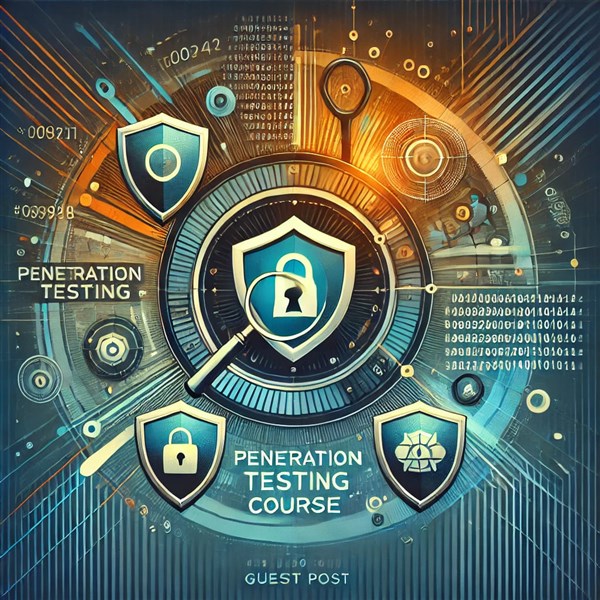
In the digital age, the demand for cybersecurity professionals has skyrocketed, with penetration testing emerging as one of the most sought-after skills. As cyber threats grow in complexity and frequency, organizations are looking for experts who can identify vulnerabilities and protect sensitive data. If you're a beginner interested in entering this field, choosing the right penetration testing course can significantly influence your career path. This guide will help you navigate the options available and select the course that aligns with your career goals, skills, and desired certifications.
Understanding Penetration Testing
Before diving into course selection, it's essential to understand what penetration testing entails. Penetration testing, often referred to as ethical hacking, is the practice of simulating cyberattacks on a system, network, or web application to identify security vulnerabilities. Penetration testers (or pentesters) utilize the same tools and techniques that malicious hackers use but do so with permission and for the purpose of improving security.
Key objectives of penetration testing include:
- Identifying vulnerabilities: Finding security weaknesses in applications, networks, and systems.
- Evaluating security controls: Assessing the effectiveness of existing security measures.
- Compliance: Ensuring organizations meet industry regulations and standards.
- Providing recommendations: Offering actionable insights to mitigate identified vulnerabilities.
Given the critical role of penetration testing in cybersecurity, acquiring the right skills through a well-chosen course is vital.
Factors to Consider When Choosing a Penetration Testing Course
1. Career Goals
Your career aspirations should significantly influence your choice of a penetration testing course. Here are some common career paths in penetration testing:
- Penetration Tester: The primary role, focusing on simulating attacks to identify weaknesses.
- Security Consultant: Advising organizations on security strategies and best practices.
- Security Analyst: Monitoring and responding to security incidents.
- Red Team Member: Engaging in adversarial simulations to test an organization’s defenses.
- Vulnerability Analyst: Specializing in identifying and assessing vulnerabilities.
Depending on your desired position, you might want to focus on specific skills. For example, if you aspire to become a penetration tester, look for courses that emphasize hands-on lab work and real-world scenarios.
2. Skill Level
Understanding your current skill level is crucial when selecting a course. Penetration testing encompasses various disciplines, including networking, programming, and system administration. If you are a complete beginner, you might want to start with foundational courses that cover basic networking and security principles before advancing to more specialized penetration testing training.
Consider the following skill levels:
- Beginner: If you have little to no experience in cybersecurity, look for introductory courses that cover the basics of networking, security concepts, and ethical hacking principles.
- Intermediate: If you have some experience in IT or cybersecurity, consider courses that delve deeper into penetration testing methodologies, tools, and techniques.
- Advanced: For those with extensive knowledge in security, focus on specialized courses that cover advanced penetration testing strategies, threat hunting, and red teaming.
3. Course Content and Structure
Examining the course content is essential to ensure it aligns with your learning objectives. A well-structured course should cover the following key topics:
- Penetration Testing Methodologies: Understanding different methodologies such as OWASP, PTES, or NIST frameworks.
- Tools and Techniques: Familiarity with popular penetration testing tools like Metasploit, Burp Suite, Nmap, and Wireshark.
- Hands-on Labs: Practical, hands-on experience is crucial for mastering penetration testing skills. Look for courses that offer lab environments or practical scenarios to apply what you've learned.
- Reporting: Learning how to document findings and present them effectively to stakeholders is an important aspect of penetration testing.
4. Certification Path
Certifications can enhance your employability and credibility in the cybersecurity field. While some courses offer certifications upon completion, others serve as preparation for well-recognized industry certifications. Here are some of the most respected penetration testing certifications:
- Certified Ethical Hacker (CEH): This certification focuses on ethical hacking techniques and methodologies.
- Offensive Security Certified Professional (OSCP): Known for its rigorous hands-on exam, OSCP is highly regarded in the industry and emphasizes practical penetration testing skills.
- CompTIA PenTest+: A vendor-neutral certification covering essential penetration testing concepts, tools, and methodologies.
- GIAC Penetration Tester (GPEN): Focuses on penetration testing techniques and methodologies while emphasizing legal and ethical considerations.
When choosing a course, consider whether it prepares you for any of these certifications, as they can significantly enhance your resume.
5. Course Delivery Method
Courses are available in various formats, and your preferred learning style should guide your choice:
- Online Courses: These offer flexibility, allowing you to learn at your own pace. Look for courses with a good mix of videos, readings, and interactive elements.
- Bootcamps: Intensive, immersive programs designed to equip you with skills in a short time. They often include hands-on training and real-world scenarios.
- In-Person Training: Traditional classroom settings can provide a structured learning environment and opportunities for networking with peers and instructors.
Consider your schedule, learning style, and preferences when choosing a delivery method.
6. Instructor Experience
The quality of instruction can significantly impact your learning experience. Research the instructors’ backgrounds, qualifications, and industry experience. Experienced instructors can provide valuable insights, real-world examples, and mentorship. Look for courses that feature instructors who are active in the cybersecurity field or hold relevant certifications.
7. Reviews and Recommendations
Before enrolling in a course, check for reviews and testimonials from past students. Websites like Course Report and Trustpilot can offer insights into course quality and student satisfaction. Engaging with online communities, such as Reddit or cybersecurity forums, can also provide recommendations and personal experiences related to specific courses.
8. Cost and Financial Considerations
Finally, consider the cost of the course and whether it fits within your budget. While many high-quality courses come with a price tag, there are also free or low-cost options available. Keep in mind that investing in a reputable course may yield better returns in terms of job placement and salary.
Recommended Courses for Beginners
Now that you understand how to choose the right penetration testing course, here are some recommended options for beginners:
-
Certified Ethical Hacker (CEH) by EC-Council
- A comprehensive course covering ethical hacking concepts, methodologies, and tools. Prepares you for the CEH certification.
- Offensive Security Certified Professional (OSCP)
- An intensive hands-on training course focusing on penetration testing skills. The OSCP certification is highly respected in the industry.
- This course offers foundational knowledge in penetration testing, vulnerability assessment, and management. Prepares you for the CompTIA PenTest+ certification.
- An extensive online course covering various ethical hacking topics and tools. Ideal for beginners looking to start their penetration testing journey.
- A free course offering a solid foundation in penetration testing principles and tools.
- This beginner-friendly course focuses on ethical hacking fundamentals and practical skills.
- CompTIA PenTest+
- The Complete Ethical Hacking Course: Beginner to Advanced by Udemy
- Penetration Testing and Ethical Hacking by Cybrary
- Learn Ethical Hacking from Scratch by Udemy
Conclusion
Choosing the best penetration testing course is a crucial step in your journey to becoming a skilled cybersecurity professional. By considering your career goals, current skill level, course content, certification paths, delivery methods, instructor experience, and cost, you can find a course that fits your needs. As the demand for penetration testers continues to rise, investing in the right education will set you on a path to a successful and rewarding career in cybersecurity. Start your journey today, and join the ranks of professionals dedicated to protecting organizations from cyber threats.
Choosing the right penetration testing course can set the tone for a successful career in cybersecurity. Make sure to consider your career goals, the course content, and the reputation of the training provider. Take your first step towards becoming a skilled penetration tester with Koenig Solutions.







COMMENT